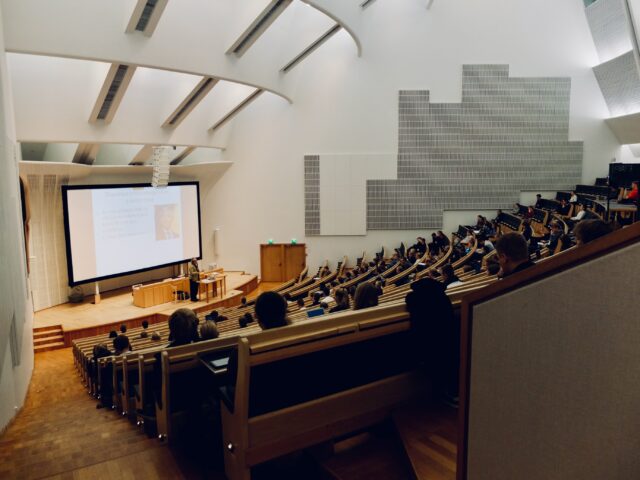In a recent article, journalist Chris Arsenault discusses the challenges that universities face as they attempt to complete medical research and navigate the expenses of academic publishing. Arsenault reports that a typical Canadian university library spends three-quarters of its new materials budget on journal subscriptions, and the cost of accessing these journals has risen over 400% in the last two decades. “[C]ontent comes to those publishers ready-made on the backs of research and research funding,” said Canadian Association of Research Libraries executive director Susan Haigh, who noted that libraries must then draw on institutional funds to buy access to these journals. The article highlights the new Peer Premier initiative launched by the University of Guelph and discusses some of the barriers postsecondary institutions face when trying to change the publishing industry.

Top Ten News
August 1, 2023
Holland College and the PEI Museum and Heritage Foundation have partnered to preserve heritage homes across Prince Edward Island. Students in the college’s heritage retrofit carpentry program will be given access to areas of heritage homes such as attics and basements and will use the buildings as a “living laboratory” so they can gain experience doing repairs. Holland College program lead learning manager Josh Silver said that students will also have the opportunity to examine the construction of the homes as they work and learn about what was done right and wrong. “[Heritage Museums are] willing to take a little step back and let us be a little bit slower knowing that in the long run we’re feeding the general population a lot of high-quality carpenters that can do this type of work,” said Silver.
The University of Calgary’s Nickle Galleries is currently hosting The Devotion: Louis Riel Writes Home exhibit, which says includes never-before-seen writings by the Métis leader. The exhibit consists of two notebooks and 37 letters sent to and from close family members, several of which were written during Riel’s exile from Manitoba. “Those are sort of the lost years of Louis Riel,” said UCalgary Rare Books and Special Collections librarian Annie Murray. The collection has been digitized for broader access and when the in-person exhibition ends, reports that the collection could be shared more broadly. Manitoba Métis Federation (MMF) minister Anita Campbell stated that they would like to build a relationship with the university and work out a loan of the collection for display at the Métis National Heritage Centre, which will open in 2026.
Dalhousie University is rolling out a new Integrated Planning Framework that is intended to create more alignment and improve efficiencies between plans and strategies across the university. The new framework follows a consistent annual cycle in which faculties and units are engaged in planning discussions from spring through to the following winter. “We want to support data-driven decision making at all corners of the university, with planning conversations that allow more locally relevant and focused input into our plans by faculty, staff and students,” said Dal vice-president finance and administration Gitta Kulczycki.
Aurora College has submitted an application to the Government of the Northwest Territories to provide a General Studies Diploma program, beginning in September 2024. The proposed program would provide students with a liberal arts and sciences education with a special focus on northern and Indigenous content. Students will be able to choose their own path through the program by selecting from a variety of courses. Upon completing the program, they will be able to bridge into a university degree or a related program. The Government of the Northwest Territories is collecting input on the application until late August.
In a recent article for the , Kevin Gannon (Queens University of Charlotte) offers a variety of strategies for creating policies on student use of AI tools. As instructors prepare for the Fall semester, Gannon encourages them to recognize that the use of AI tools is ubiquitous and that every instructor is likely to need an AI policy. The author provides several recommendations, including becoming familiar with AI tools and what they can do; developing a concise, clear policy with an approach that is appropriate for the course; and considering what and how coursework should be adapted so it is not easily completed by AI tools. Gannon encourages instructors to remember that flexibility is beneficial in a quickly changing landscape.
In an era when the redesign of historic modernist buildings is cause for concern among architects, the recent projects at the University of British Columbia and Simon Fraser University are a breath of fresh air, writes Trevor Boddy. Boddy highlights the improvements to accessibility and durability undertaken at the SFU Plaza and Student Union Building, as well as UBC’s ongoing renovations to the Museum of Anthropology, which included a rebuild of the Great Hall. The author praises the work done to the SFU Plaza and UBC Museum but offers a mixed review of the SFU student union building due to design choices such as the lack of food services or a student pub. “In an era when glowing showpieces and sculptural indulgences drive too much of the architectural press, the time has come to praise restraint and respect, along with the deep knowledge and experience that empowers these design approaches,” concludes Boddy.
The Dumont Technical Institute and Saskatchewan Indian Institute of Technology will offer a new two-year Mental Health and Wellness diploma program this Fall. The program covers topics such as wellness, youth care, addictions, case management and assessment, and Indigenous models of healing. Graduates will be prepared for work as social and community service workers in a variety of workplaces. “After the last few years during and post-pandemic, there has become a greater need for awareness, services, and service providers in the area of mental health and wellness,” stated the institution. “We are hoping this program helps fill in these gaps.”
Postsecondary institutions must rethink sustainability to respond to climate change challenges, writes University of British Columbia Associate Professor Sharon Stein. Stein writes that climate change poses a “wicked” problem due to its complexity, and that those interested in coordinating climate responses across multiple disciplines should be aware of the differences between mainstream sustainability approaches that aim to maintain an unsustainable system and critical sustainability approaches, which frame colonialism and capitalism as the root causes and drivers of climate change. Stein writes that universities that are embracing critical sustainability should recognize their own roles in climate change problems and pursue regeneration and repair when working towards sustainability.
Memorial University has reopened the University Centre at the St John’s campus after experiencing “massive” flooding. CBC reports that the flooding was caused by a sprinkler head that went off in a cooler. VOCM reports that witnesses saw water “flowing down the steps on the south side of the centre.” The building was evacuated on Saturday and closed to all except staff as custodial staff cleaned up the water. The extent of the damage is not reported, but the centre has since reopened for normal operations.
